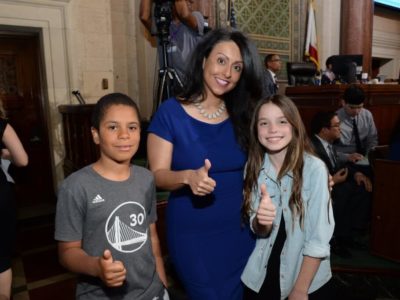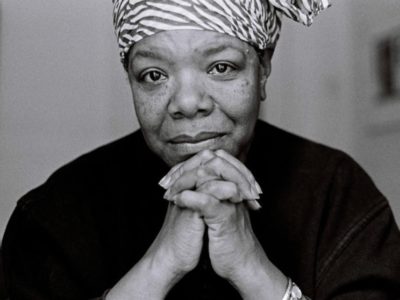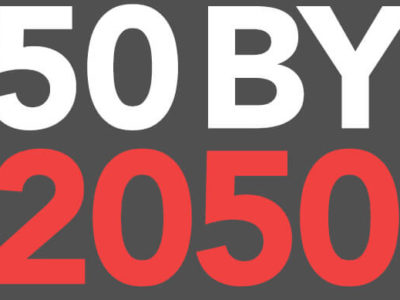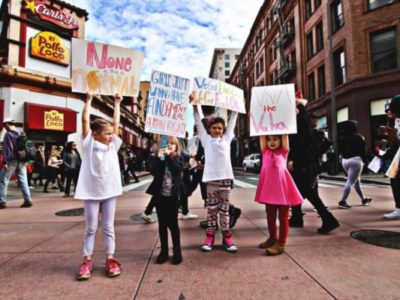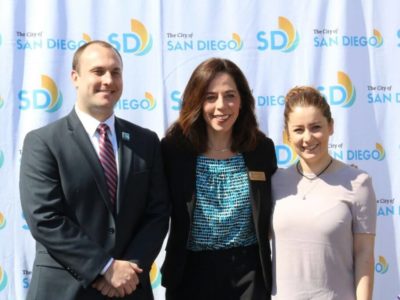Since elementary school, Nury Martinez knew that she wanted to be in the L.A. City Council. Flash forward to 2013, and her dream turned into a reality. She joined the council as the only female councilmember. She’s tackled issues from human trafficking to gender equity in the local fire department. A mother who works hard to balance her family life and career in public service, Martinez knows that her position can inspire young women to run for office. Through programs like her Ready for Women fellowship, Martinez supports these young women and encourages them to make their dreams reality like she did.
CAREER TIMELINE
1995– Graduated with a B.A. from California State University at Northridge
2009 – Elected to L.A. Unified School Board
2013 – Elected to L.A. City Council
2015 – Re-elected to L.A. City Council
Q&A WITH POWERFUL WOMEN LEADER NURY MARTINEZ
Q: At College Magazine we’re working together with EMILY’s List, Emerge America, Human Rights Campaign, Higher Heights, She Should Run, Victory Fund and IGNITE on an initiative to fight for equal representation in Congress called “50 by 2050.” What are your thoughts on the goal of achieving 50% of women in Congress by 2050?
A: Well, not only getting them prepared to run, but actually getting them elected. That’s seems to be the bigger issue. I mean, I think that the women are there when it comes to finding qualified women to run. They’re terrific in helping to get other people elected. Most of the time it’s the women who do all that. And when they actually get elected, it’s actually the women who are running the elected official’s office. So there is definitely qualified women to run, we’re just not getting them elected, which is an even bigger problem.
It’s a great goal to have, but besides getting it to 50/50, I think we need to start developing that pipeline so that when a congressional seat opens up or when someone wants to challenge an incumbent, we have the women ready to run and back her. I think it’s a real issue in terms of whether or not we’re going to coordinate efforts to back one woman and make sure she’s ready and viable to run. Because then we have this situation where women are constantly running against each other and then no one gets in. If we’re going to set that goal, then I think we need to think about that pipeline and pay attention to those seats. We need to do our homework and make sure she’s ready to go. That’s how they get elected.
Q: Over the last few months in particular, we’ve seen more women running for office and getting involved in that process. How do you feel that will end up shaping the political sphere in this country?
A: Gender equality is not only good for society, but I also think that women elected officials also make terrific legislators. Women have just normally come with that solution-driven kind of comments to an issue, which I think is a breath of fresh air, especially with what we’re seeing at the national level.
In my district, for example, there were two corridors that had the highest prostitution charges. People have always talked about it. But until I got elected, we didn’t start looking at it or calling it human trafficking. Because a lot of the women that people refer to as prostitutes happen to be 14-year-old kids. And so from looking at it from a different lens, perhaps because I am a woman and a mother, that didn’t sit well with me. It’s figuring out how we go after the perpetrators who are trafficking these kids and calling these girls what they are, [victims].
This is just an example of what happens when you get women elected. You just look at the problem in a different way. I think that makes a huge difference when you have that gender lens debating any issue that comes before us. And I think it sets the tone of what our girls want from us and what they aspire to be when they grow up. My daughter happens to have a mom who’s the only woman in the city council. So my daughter knows that she can do or be whoever she wants to be. I hope that we can do that for politics as well, that girls can see themselves running for office. That’s good for our society and young girls, and we got to continue to model that for them.
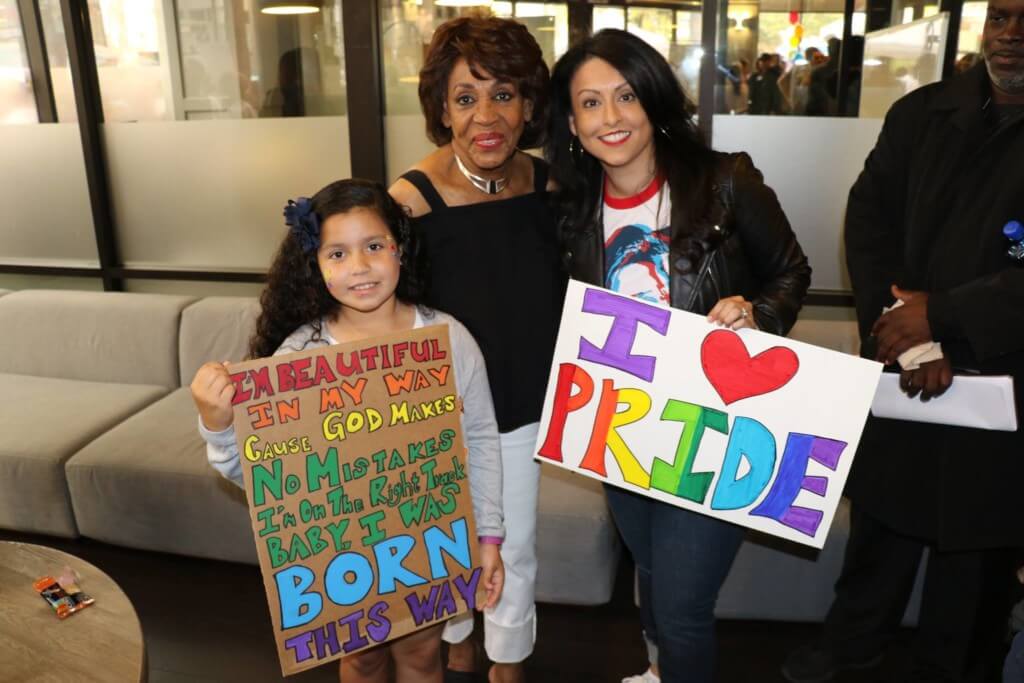
Q: How did you decide that you wanted to run for public office? What inspired you?
A: The L.A City Council is my dream job. I knew ever since I was in elementary school that I wanted to run for office. I was that awkward kid that always had questions about politics. At a very early age I got interested, and I got involved when I was a teenager. I volunteered for local campaigns, did door knocking, helped at food banks and stuff like that. And then I got into actually helping women get elected. I was a campaign manager for a couple female candidates running for office. So I always knew that I wanted to do this.
The L.A. School Board came around because I was pregnant and because I’m a product of the public school system. You know, one of the toughest decisions you make as a parent is where you’re going to send your kids to school. And I represent a community that is working class, disenfranchised communities of color, which is where I grew up. The choices that my parents had on where to send me to school were very, very limited, so I went to my local school.
I was very lucky that I had parents who were very involved in my educational experience even though they didn’t speak a word of English and didn’t understand the American education system. And I also found teachers who liked me and just saw me as a dedicated kid who liked school. But I also remembered 80 percent of the kids I went to school with who fell through the tracks. And so that’s what interested me when I was running for school board.
I just didn’t know if there would ever be an opening in city hall and whether I was going to make that jump. It wasn’t until 2012 when my predecessor announced that he was going to leave two years early from his council seat to run for Congress. And here’s when I thought to myself, here’s my opportunity. I needed to make a decision now whether I’m going to run for that city council seat.
And so I took a leap of fate and I ran. It was a special election, and in my primary I came in a distant second. I ran against another woman. She almost beat me in the primary. If no one gets more than 50 percent of the vote it’s an automatic run-off. And so the only thing that kept her from outright winning was that she didn’t get 50 percent. She beat me by 19 points. A lot of my support blasted out the door. They didn’t think that I could turn it around and raise enough money to beat her.
Even though I believed that there was a path to victory, I knew that I needed to do things differently. So I walked every day in every precinct in my district during one of the hottest summers in the San Fernando Valley. And on July 23, almost two months later, I beat her by 10 points. So it was almost a 30 point swing. It’s never been done in the city of Los Angeles, and it proves that it can be done.
Q: Did you face any specific challenges as a woman running for office?
A: When I ran for the school board in 2009, I was seven months pregnant. I gave birth to my daughter two weeks before I was elected to the school board. That was challenging enough, to be running while you’re pregnant. That was in of itself a challenge, but also I came across a lot of people who were really judgmental about me running for office and having this newborn.
I remember a woman at an endorsement meeting. She said to me, “You’re pregnant.” And I was like, “Yes it’s quite noticeable.” And she asked me, “Shouldn’t you stay home to raise your daughter?” And the only thing I did to not let it get to the best of me was ask her, “Well how many male candidates did you ask that question to?” A lot of the men that I know that are running for office are parents too, and they don’t get asked that question. I grew up with a mom that was really strong, who worked all the time. And so my mom wasn’t always home when I came home from school, and I turned out okay. And just the fact that people would say that to your face with absolutely no sense of decency in 2009 was frustrating.
It happened to me again, four years later, when my daughter was four years-old, and I was running for L.A. City Council in 2013. I was knocking on doors, and a woman asked me where my daughter was and who’s cooking dinner for her. And she had a problem with me out in the early evening because she thought that my daughter wasn’t being attended to or provided for. That sort of double standard that you can’t possibly be elected to office or go up the corporate ladder because it’s your only responsibility to raise your family and that no one else can do it besides the mom, is just unbelievable. And I’m constantly having to answer to people where my daughter is at, who’s cooking her dinner and who’s picking her up from school, as though I don’t have a partner in my life. That’s always been a challenge.
Q: What issues are you passionate about?
A: Human trafficking is something that I work on almost every day. Like I said, it’s just something where people have been doing the same thing for the past 30 years, even though we’ve always known that the problem exists. It’s something that I take very seriously.
I’m also focused on gender equity when it comes to our fire department. It’s a nontraditional career for women. When I was growing up, I don’t think I remember seeing a woman firefighter. And so we’ve been trying to not only diversify our department in Los Angeles to reflect the community that it serves, but we also are trying to encourage young girls to want to be firefighters when they grow up.
And so how do we do that? We launched a recruiting campaign. Some of our women are going into the armed services or are athletes, and we go to universities and high schools where we see these girls doing amazing things. We want to tap them early and say, “Hey, here’s another career choice for you. Come learn about the fire department, how you can take the oral exam and how we pair you up with some women firefighters in the department so they can help mentor you to get into our academy and be a firefighter. It’s a wonderful career, but women don’t see themselves in that role.
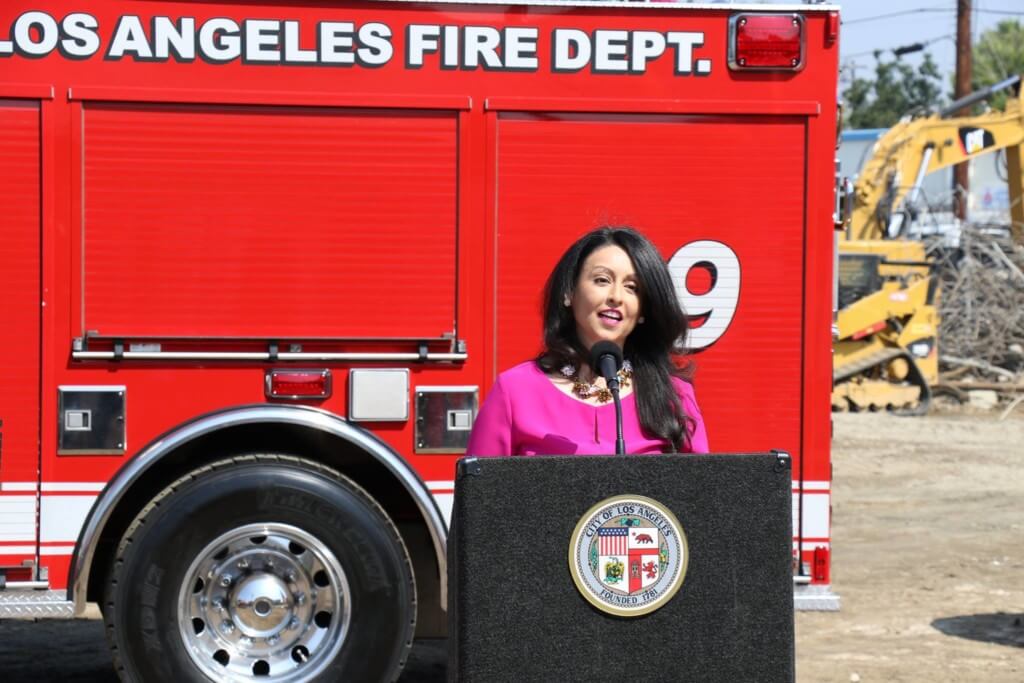
Q: Do you have a moment or project that you were involved in that has been the most rewarding of your career so far?
A: I created something called the San Fernando Valley Human Trafficking Task Force, and for the past two years I’ve fought during the budgeting process to give them a million dollars. So the Task Force is made up of 10 officers in my district, and the purpose of the task force is to focus on arresting the pimp. So we’re taking the focus out of arresting the kids, because that doesn’t do anything. Sending this poor 14-year-old kid to juvenile hall isn’t going to make her better. And so we need to shift focus onto the victim, and work to get her the resources she needs to turn her life around.
A lot of work in this task force is surveillance and undercover work to go after these criminals who are making millions of dollars trafficking these kids. I mean, some of them have anywhere from six to 10 girls that they are working with, they bring them across the country and they lure them into this world of prostitution. Being able to rescue these kids and having these kids turn around their lives is very, very difficult. Lock them up, and find the resources we need so the victim can be in a shelter.
Q: Can you speak more about your Ready for Women program?
A: We have a number of applications and it’s very competitive. Me and my staff wondered, “How can we inspire more women to run for office? How do you expose them to this career?” I often say that you can’t be what you can’t see. We decided to create a competitive application process for college women either majoring in political science, have a little bit of campaign experience or just know that this is something that they want to do.
We were inundated with applications. They can apply on my website and I believe the program is for anyone who’s a junior or senior in college or doing some sort of graduate program. And the only requirement is that you want to run for office. I don’t want anybody who’s thinking about it and want to give it a try. No, I want to hear that this is what you want to do and your plan to get there.
And so we only accept four applicants per year and they work with us throughout the summer. It’s also a paid internship. We have them shadow one staff member, and I do like to pair them up with whatever subject matter or policy they’re interested in. I want the women to feel comfortable in whatever policy area they’re interested in. And they also get to shadow me down on council chambers. We meet on Tuesdays, Wednesdays and Fridays at 10, and so they have an opportunity to shadow me and help. If you have a particular interest in media, you can shadow the press director and figure out how we work the media as well.
This is our fourth year. Our girls have gone back to school and have graduated and sometimes they’re out volunteering or getting hired by other campaign officials, and hopefully starting to lay out their plan on how they’re going to get elected. And they have access to that pipeline, creating relationships in those areas and communities that you live in and sort of laying the groundwork for themselves so when there’s an opportunity that comes up they’re not scrambling. They’ve already made those contacts and are ready to go. I want them to network amongst themselves, and I don’t want them to lose touch with the office. I want to know what they’re doing and check in with them. I’ve even hired some of them.
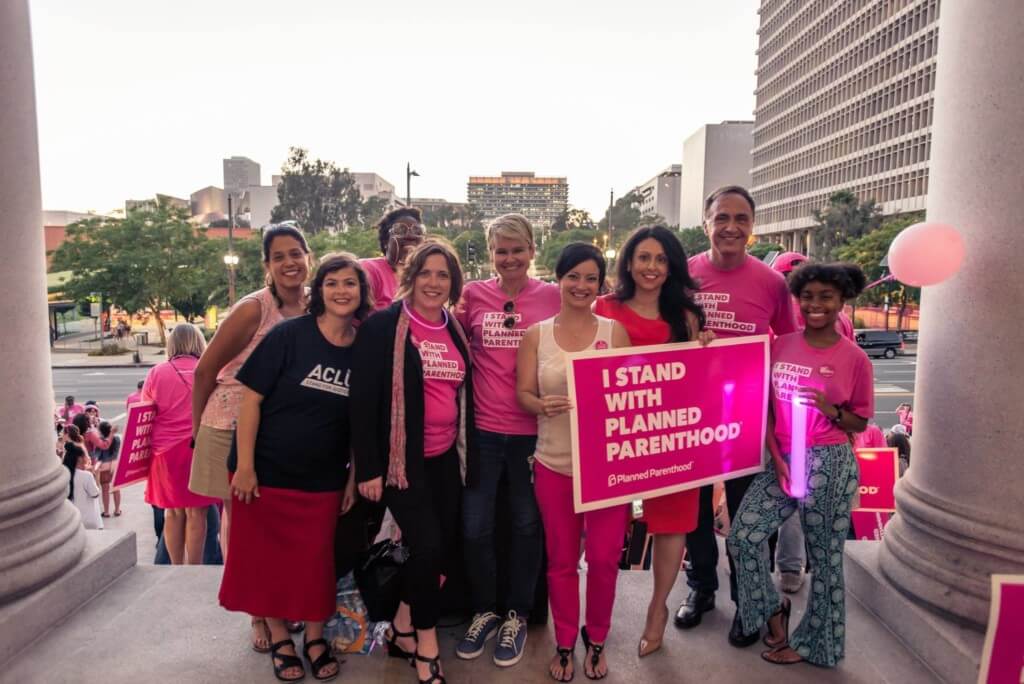
HOW TO BECOME A POWERFUL WOMAN LEADER
1. Get political on campus
“There’s a number of chapters. I know there’s a lot [of] women’s chapters. A lot of elected officials, when they’re looking to recruit people they head to local universities and colleges. And so a lot of times the way that you get to know who the players are in your area is by becoming active in college or volunteer in a local campaign,” said Martinez.
2. Volunteer in local campaigns
“[Elected officials] love that. If you are there helping put together binders, stapling precincts, highlighting stuff, if you’re really good with computers and you’re helping them with web design or social media, or if you’re really good with photography. Any of those talents are things any candidate running for office can use,” said Martinez.
3. Stand out and network
“If you can apply your talents to a local race and sort of get involved that way and get your foot in the door, it’s amazing. That’s how I got started. You just get to know the elected. A lot of the time that turns into a relationship with his or her staff or with the elected official. And that can turn into a job or an internship. What young people don’t understand is that so much of this is networking. It’s who you know and who can vouch for you. Those are the people who stand out. That’s the best way to get involved. You need to stand out, and the earlier you get started campaigning or learning about an issue, the better,” said Martinez.
HOW TO CONNECT WITH NURY MARTINEZ
Like and follow her on Facebook
Email her at [email protected]
Call her at 213-473-7006
Visit her at her City Hall location:
200 N Springs St, Ste 470
Los Angeles, CA 90012

